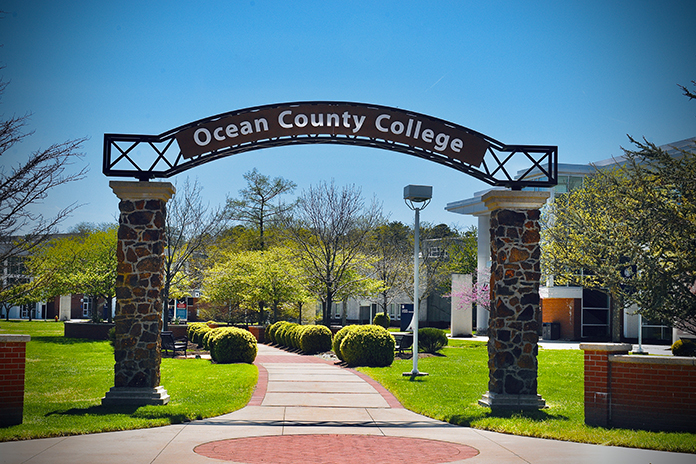
TOMS RIVER – The Addictions Counseling Certificate of Completion program at Ocean County College provides a solid first step for students who want to become a drug and alcohol counselor and provides the mandatory core courses for them to earn their New Jersey credentials.
To become a state-certified counselor, students need 270 education hours, all of which are encompassed in the program, where they take six, three-credit courses. “Students get two things at the same time – the education hours and the credits, which sets them well on their way to an associate degree,” says Patty Gianotti, Ph.D., college lecturer II, Addictions Counseling. “They have such a sense of accomplishment when they complete this program.”
The need for counselors in this field is projected to grow 31 percent by 2022 – faster than the average for all occupations.
“OCC is at the forefront in providing the highest quality training for professionals in this field at a time when they are most needed,” says Rosann Bar, Ph.D., dean of the School of Business and Social Sciences.
The State of New Jersey offers two credentials for students wishing to pursue a career in this field. The first, the Certified Alcohol and Drug Counselor (CADC), is obtained through the Addiction Professionals Certification Board of New Jersey and allows an individual to practice under supervision. The Licensed Clinical Alcohol and Drug Counselor (LCADC), which is managed through the State Board of Marriage and Family Therapy, enables the holder to practice independently. The LCADC license requires a master’s degree in counseling or a related field in addition to the basic requirements for the CADC.
Innovative Addictions Counseling programs at OCC: In addition to the state-mandated educational requirements, students working toward the CADC credential must complete 3,000 supervised hours in a clinical setting. They complete these hours independently by acquiring paid trainee positions in a treatment program. While pursuing their clinical field experience, students may opt to enroll in OCC’s degree apprenticeship program, which is part of the College’s movement toward increasing its work-based and experiential learning opportunities.
Currently, the Ocean County College Foundation has established a scholarship for those who desire the additional academic and field support provided through this course during their clinical training period.

“It is our hope that the financial help for this pilot program will build a base and act as a template for a dynamic for-credit apprenticeship model across disciplines at OCC – to become embedded at the College,” says Kenneth Malagiere, executive director of the Foundation. “It also will create valuable partnership opportunities for OCC with area addiction and recovery organizations.”
Earlier this year, OCC was awarded the GAINS (Growing Apprenticeships in Nontraditional Sectors) Grant from the N.J. Department of Labor, which seeks to increase availability of trainee positions for students and establish a reasonable rate of pay for student trainees.
“The grant reimburses employer partners 50 percent of the apprentice’s hourly rate, which creates an incentive for employers to hire our students. This increases clinical training opportunities and builds relationships with local programs so we may assist them in finding positions in the field,” says Bar.
Another initiative is the Michael Camillus Project, a joint program between OCC, Ocean Mental Health Services and the Ocean County Prosecutor’s Office funded by the New Jersey Office of the Attorney General through Operation Helping Hand. Renee White, an OCC alumna and supervising assistant prosecutor in the Prosecutor’s Office Special Offender’s Unit, developed the idea to enroll members of law enforcement in addictions studies courses.
“She wondered how we might make police officers more sensitive to people in the community and their needs … how we can further educate them, giving them a better skill set to manage situations where addictions are part of the situation,” says Bar.
White enrolled 14 members of law enforcement into the first of six courses that began in January. Through this sequence of courses, the officers acquire hands-on skills for dealing with people on the streets, with the goal of preventing escalation of certain situations when drugs and/or alcohol are involved.
Bar further explained that the law enforcement officers in this cohort complete the same courses and have the same responsibilities as all OCC students. She adds, “We are excited about this model program and have already had positive feedback from the participating officers. This pilot program takes police training to another level.”
OCC is working on an articulation agreement for a 3 + 1 program that would allow Addiction Counseling students to stay at OCC for their third year of school and then complete the last year of their bachelor’s degree in Human Services at Southern New Hampshire University. The College is hopeful that its 3+1 certificate program in Advanced and Continuous Studies will receive state approval in the coming months.
As OCC develops more partnerships with addictions treatment and counseling centers, and continues to build its reputation for its addictions programming, Bar believes this program will become a model for other schools and police departments.






